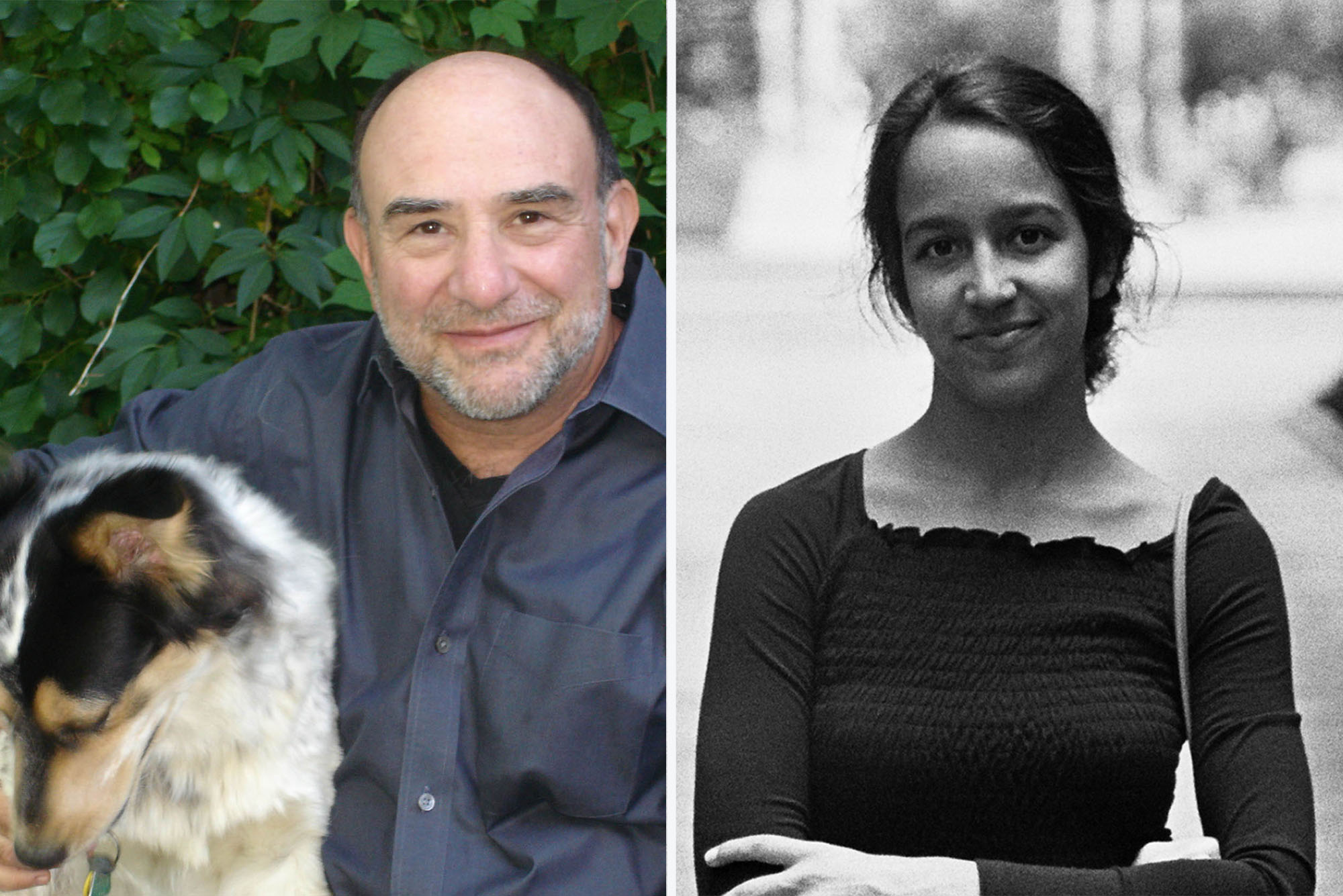Pulitzer-Winning Poet Philip Schultz to Deliver Spring 2024 Robert Lowell Memorial Lecture March 7

“I want readers to be moved, I want them to care about what I’m writing about,” says Philip Schultz (left), whose poems are about “understanding my inner emotional life.” When she isn’t writing poetry, Milica Mijatović (GRS’20) works as a content designer for Intuit Mailchimp, responsible for improving user experience through language and design. “Even when I’m not focused on poetry, I’m working with words, thinking about how they’re perceived in certain contexts, how they sound, what meaning they convey,” she says. Photos courtesy of Blue Flower Arts and Igor Kojadinović
Pulitzer-Winning Poet Philip Schultz to Deliver Spring 2024 Robert Lowell Memorial Lecture March 7
Event will also feature Serbian poet and BU alum Milica Mijatović
When Philip Schultz received a call telling him that he had just won the Pulitzer Prize for Poetry for his 2007 collection, Failure, he feared the committee had made a mistake. “We’re talking about a kid who didn’t learn how to read until he was 11, and was held back twice,” Schultz says.
Growing up in a poor neighborhood in Rochester, N.Y., the son of Jewish immigrants, Schultz had severe dyslexia, a learning disability that went undiagnosed for decades. He was bullied, demeaned by teachers, his childhood “one big fight for survival.”
“It was humiliating,” he recalls. To cope, Schultz created an imaginary world. He became a storyteller, setting up a circus tent in his backyard that had once belonged to an uncle, where he’d tell neighborhood kids any story they liked for a nickel. He eventually learned to read, with the help of a tutor and his mother, who would read him his favorite comics at night. He taught himself to read by memorizing the dialogue of his favorite Black Hawk comic heroes.
Today, he’s the author of eight acclaimed collections of poetry and two memoirs. And on Thursday evening, March 7, Schultz will read from his work as the featured guest at Boston University’s spring 2024 Lowell Poetry Reading at Hillel, where he’ll be joined by Creative Writing alum Milica Mijatović (GRS’20).
Both of Schultz’s memoirs—2011’s My Dyslexia and 2022’s Comforts of the Abyss: The Art of Persona Writing—are drawn from lessons learned as both a writer and teacher (he founded the acclaimed Writers Studio in New York four decades ago). His work has appeared in The New Yorker, Ploughshares, The Nation, Poetry Review, and numerous other publications.
Schultz’s first two books, 1978’s Like Wings and 1984’s Deep Within the Ravine, earned him literary prizes and seemed to augur a promising career as a poet. But then he did something almost unthinkable: he stopped writing poetry for nearly two decades, focusing instead on fiction, intent on writing a novel.
“I wanted to give fiction a chance,” he says. “I had had success with poetry and I thought [fiction writing] would work out…the storyteller in me identified more with the novelists I loved, like Hemingway and Walker Percy.” For much of those two decades, the poet and the fiction writer in him were at odds with each other. “Often, they weren’t even speaking to each other,” he recalls in a recent interview with BU Today. “The fiction writer resented the success the poet had.”
But a number of changes in his personal life ultimately led him back to verse. He fell in love, married, started a family, and launched the Writers Studio.
“Love became my main subject, understanding how and why it had taken me so long to give myself what I wanted most,” he says. “I now was a husband and father, and could stop being an only a kid in a tough neighborhood.”
He finally realized that poetry “is what I loved best and was best at.”
What followed were a series of critically praised collections, starting in 2002 with The Holy Worm of Praise. The publication of Failure, which drew, in part, on his father’s many failed business attempts and premature death, and the resulting Pulitzer Prize, was a turning point. The Pulitzer judges hailed Failure as “a superb new collection from one of America’s great poets.” Suddenly, Schultz’s books were being translated into other languages and published around the globe.
And he found a way to merge his passion for poetry with his fascination for novel writing. He began writing longer narrative poems, like the “The Wandering Wingless,” a nearly 54-page poem that drew on 9/11 for inspiration and forms half of Failure. And his 2014 poem The Wherewithal is a novel in verse, dealing with the Holocaust and the Vietnam War.
Schultz says that his years of struggling to write novels helped with his poetry. “All that I learned about narrative, personas, and structure helped me write The Wherewithal,” he says. ”My desire to write fiction allowed me to know how to tell that kind of larger story.”
Also, the tenacity that was required to learn how to read (Shultz says his dyslexia still causes him to read very slowly) paid off in unexpected ways. It taught him to stubbornly persevere as he revises poems, some of which undergo hundreds of drafts. “It’s a slow, determined process of endless revision, a battle with myself in a boxing ring big enough for only one contestant.”
The humiliation and torment he faced as a child unable to read also made him a more compassionate writer and teacher. “It made me very sympathetic to the struggles of others—in fact, that’s my main subject—understanding personal struggle and emotional truth,” he says.
Inheriting war
Joining Schultz at Thursday’s event will be Milica Mijatović, who graduated from BU’s MFA Creative Writing program in 2020. Born in northern Bosnia and Herzegovina, she relocated with her parents and sister to Akron, Ohio, shortly after the end of the Bosnian War in 1995, which had claimed the lives of more than 100,000 people. Many of her poems focus on war and conflict—not the battles themselves, but the ways war is passed down from one generation to the next, why it happens in the first place, and how it haunts those left in its aftermath.
And while the war had ended two years before her birth, Mijatović says she feels as if she inherited war and that it continues to reverberate in her life.
“We constantly need to remind ourselves we’re talking about people. People just like me, like you,” Mijatović says. “Too often, war is talked about as this event that happens elsewhere or happened a long time ago, too long ago to be relevant. Or we talk about war using seemingly inconsequential language: this side won, this side lost, this side is leading, the other side is getting close. And we tend to do this with sweeping generalizations that too often villainize and dehumanize an entire country, people, culture. I vehemently push back on that, and one way of pushing back is talking about war and focusing on the human experiences and consequences.”
Her first chapbook, War Food, which explores war, friendship, and resilience, won the 2022 Fool for Poetry International Chapbook Competition. She is also poetry editor for Consequence, an international literary journal that explores themes of war and geopolitical violence, focusing on the often overlooked consequences of war. “We look for work that moves difficult conversations forward in original and feeling ways,” she says.
Mijatović credits BU’s Creative Writing program with shaping her as a writer. “It might sound ridiculous, but I learned to read for what felt like the first time when I arrived at BU,” she says. “The MFA program helped me become a better, more diligent reader, and in turn, I became a much stronger writer.”
Next up for her is a second chapbook and the publication of her first collection of poems, Delusions of an Immigrant Child. She also hopes to continue a project she began while at BU: translating the poems of Serbian poet Desanka Maksimović’s poems into English.
Despite the fact they come from different generations and different parts of the world, there is much that connects these two poets, says Robert Pinsky, a William Fairfield Warren Distinguished Professor, College of Arts & Sciences professor of English and of creative writing, and three-time US poet laureate. “With all the compression and courage of poetry, Miica Mijatović and Philip Schultz engage the mighty underground forces, creative and destructive, that connect family history and world history, one life and many lives.”
Listen to Philip Schultz read his 2011 poem “Hitting and Getting Hit,” in which he recounts his experience as a child with undiagnosed dyslexia, here.
The Robert Lowell Memorial Poetry Reading, featuring Philip Schultz and Milica Mijatović (GRS’20), is Thursday, March 7, at 7:30 pm, in the Hillel River Room, 213 Bay State Road. A book-signing and reception will follow. The event is free and open to the public. Find more information here.
The Robert Lowell Memorial Reading series was established by Nancy Livingston (COM’69) and her husband, Fred M. Levin, through the Shenson Foundation, in memory of Ben and A. Jess Shenson.

Comments & Discussion
Boston University moderates comments to facilitate an informed, substantive, civil conversation. Abusive, profane, self-promotional, misleading, incoherent or off-topic comments will be rejected. Moderators are staffed during regular business hours (EST) and can only accept comments written in English. Statistics or facts must include a citation or a link to the citation.